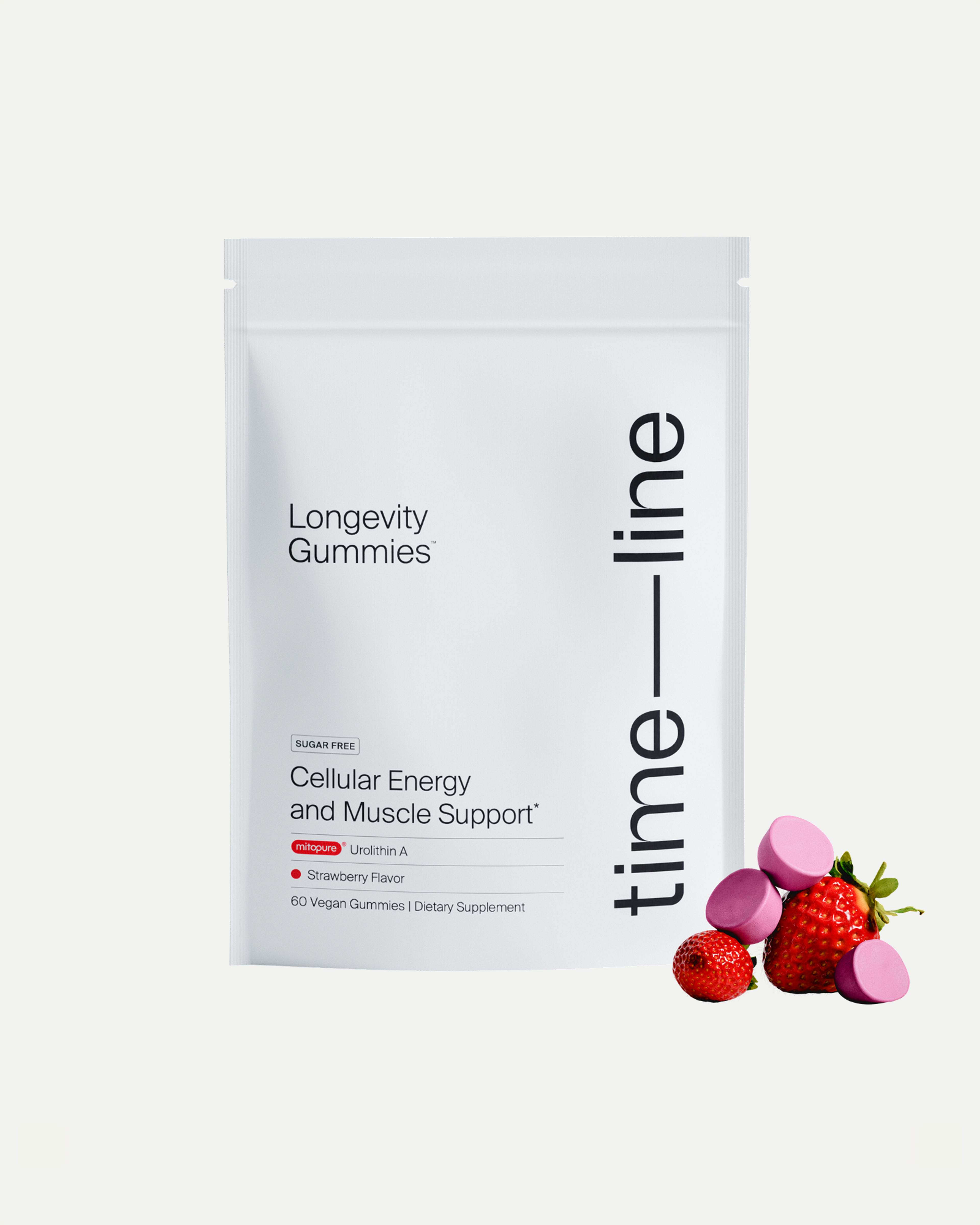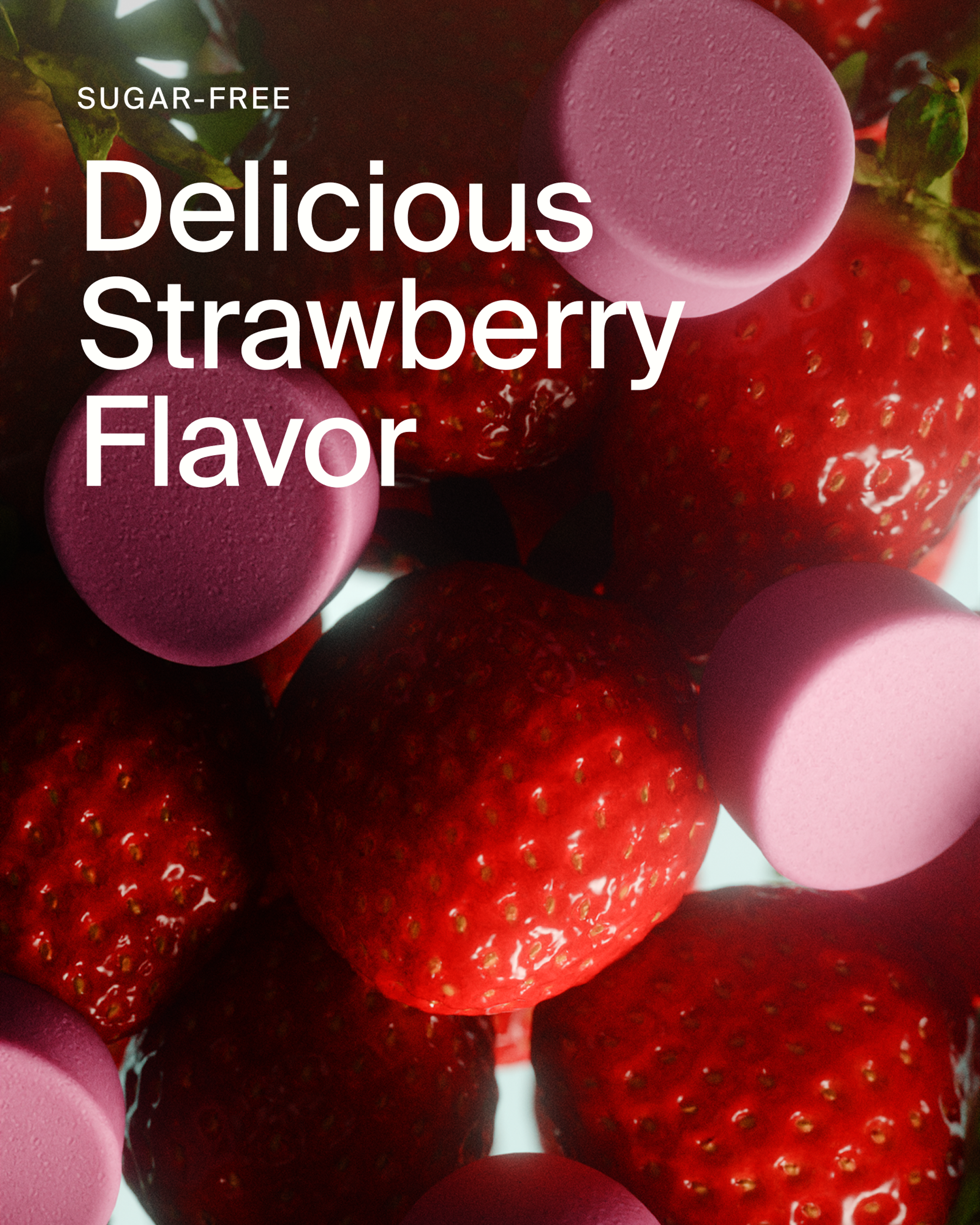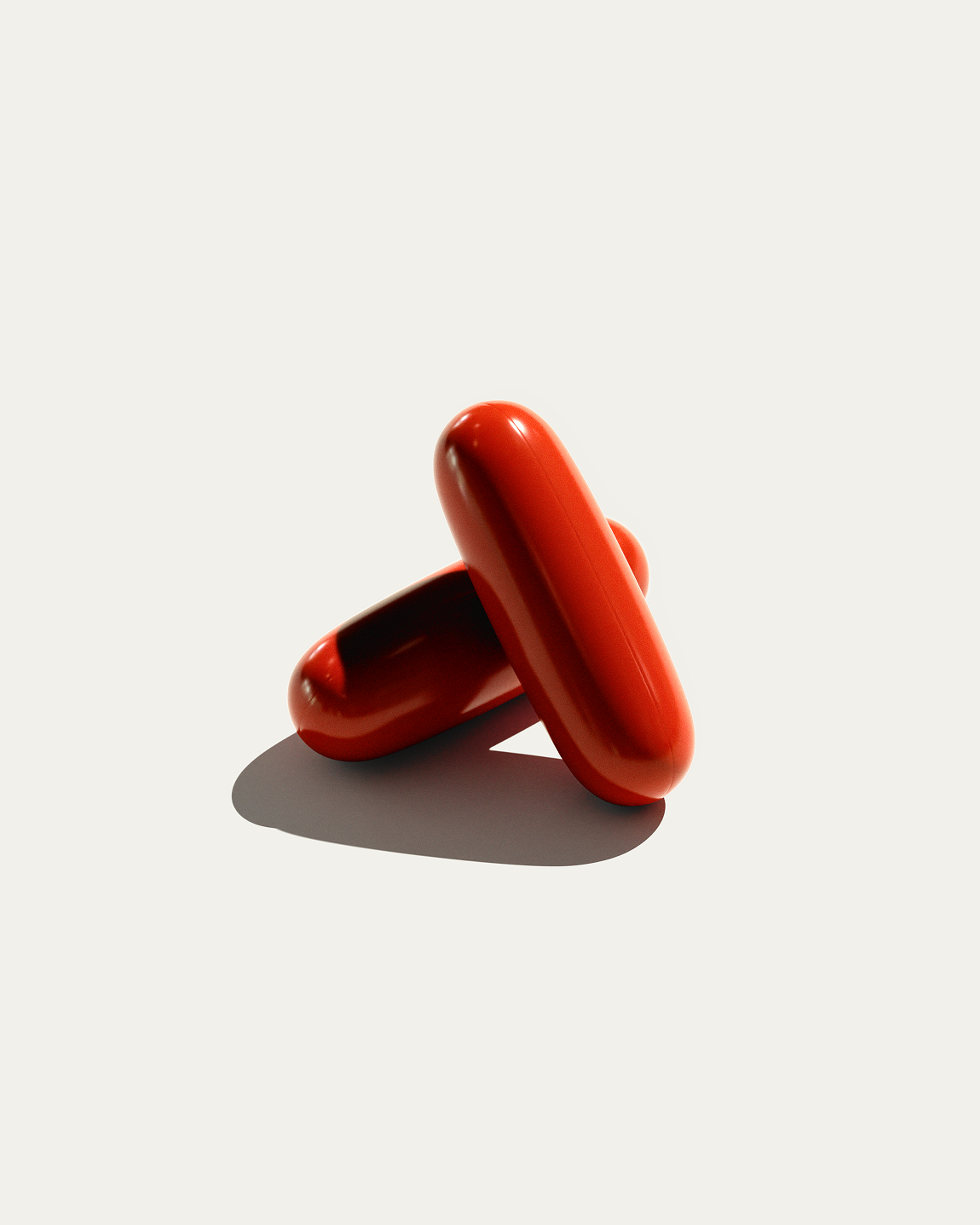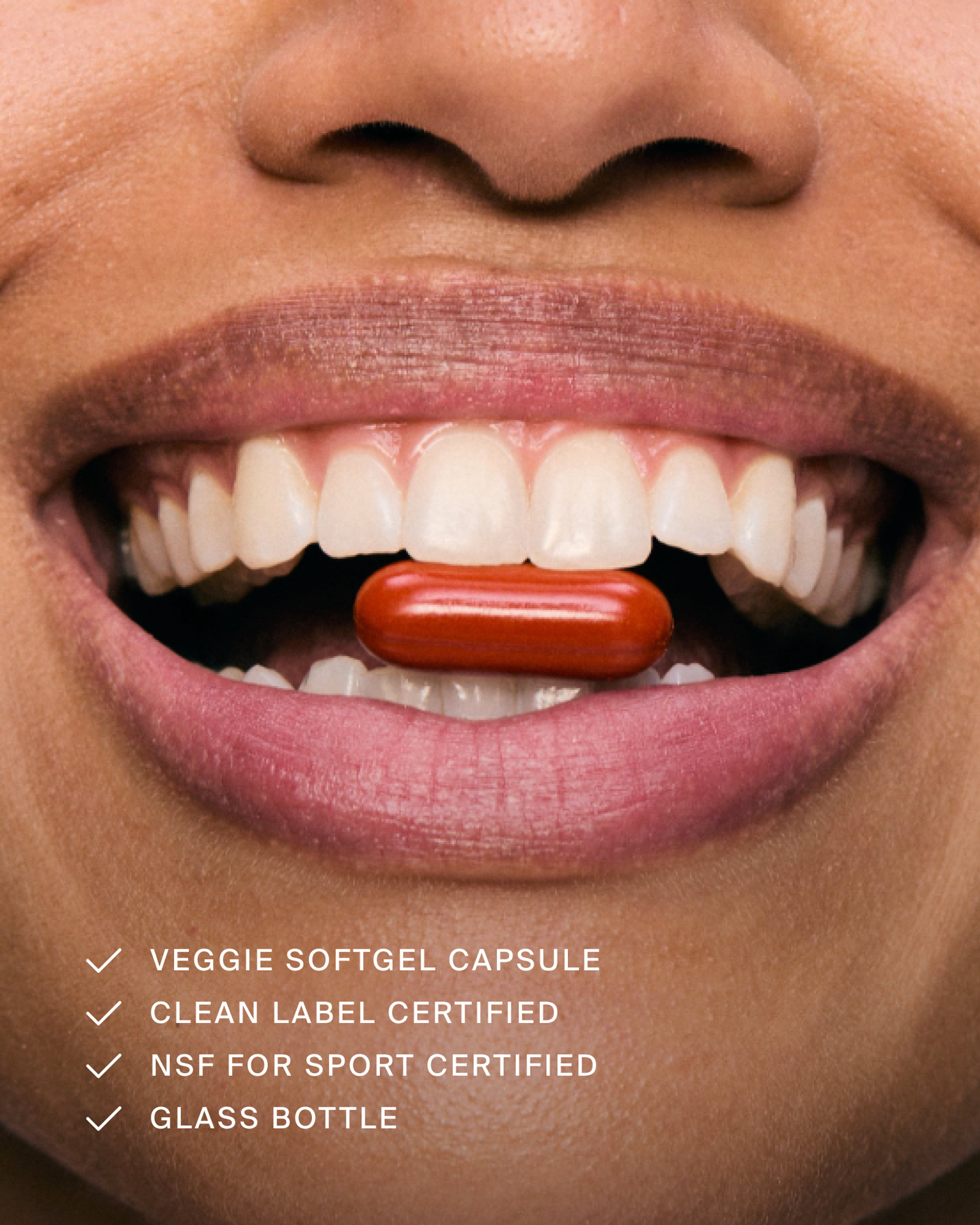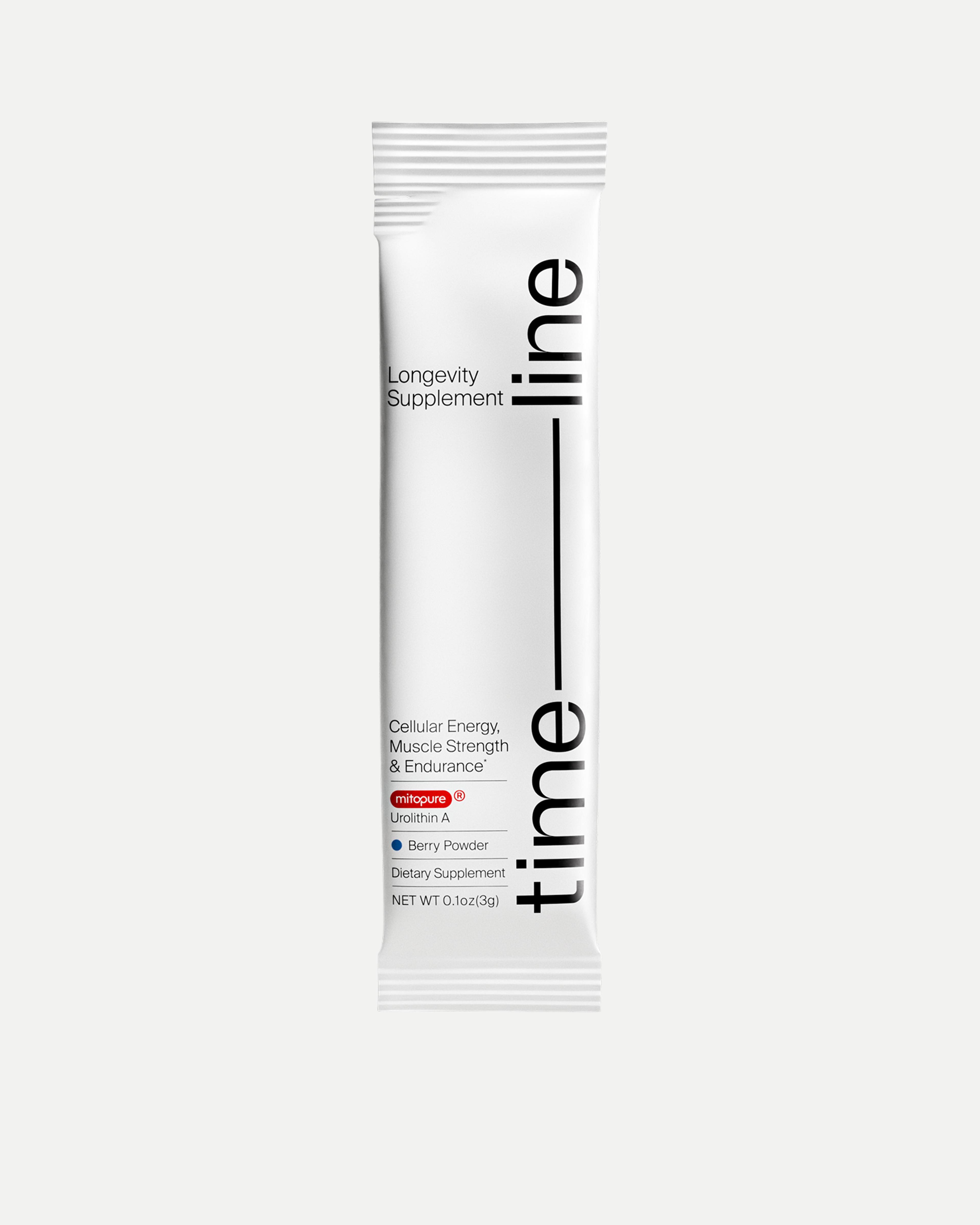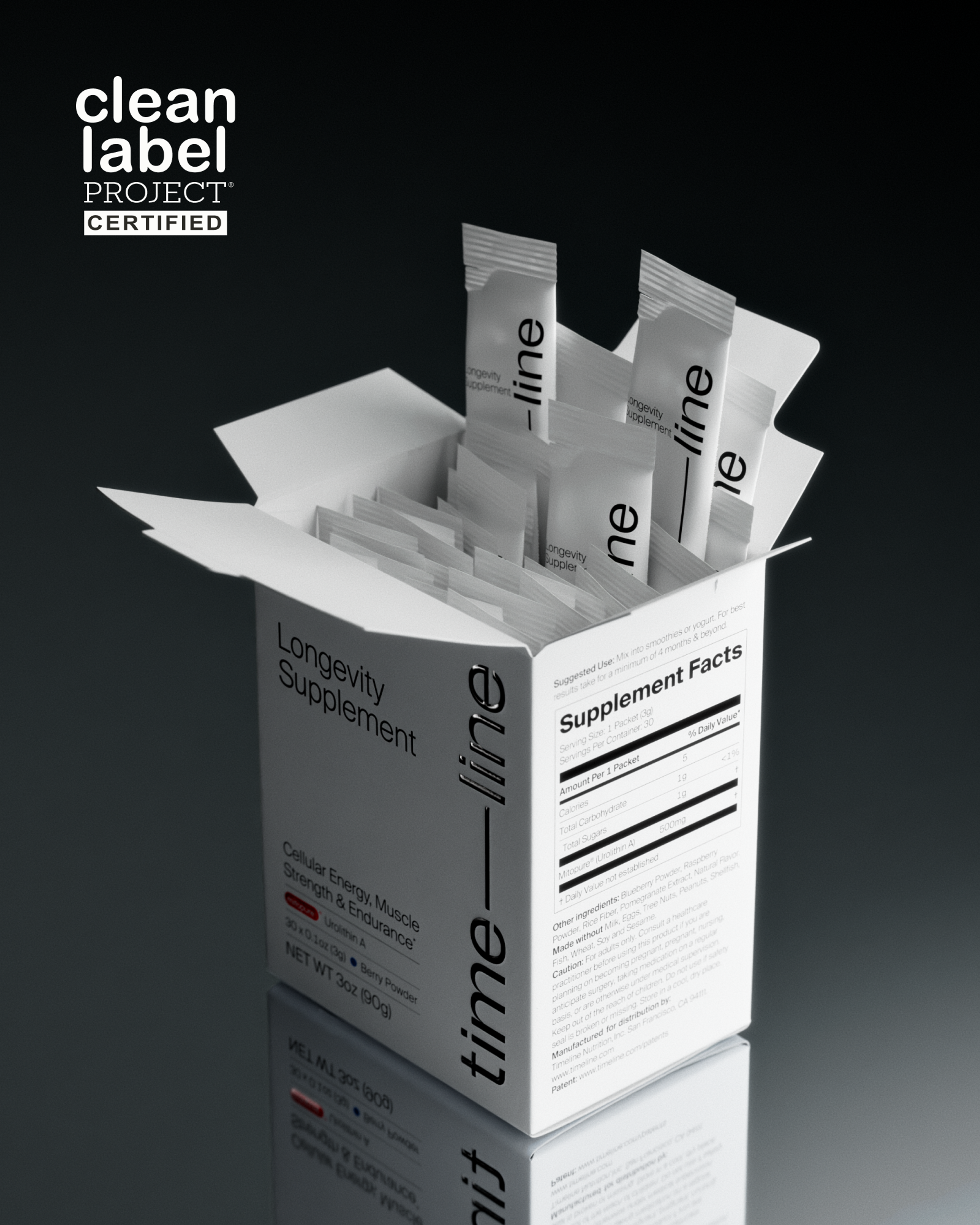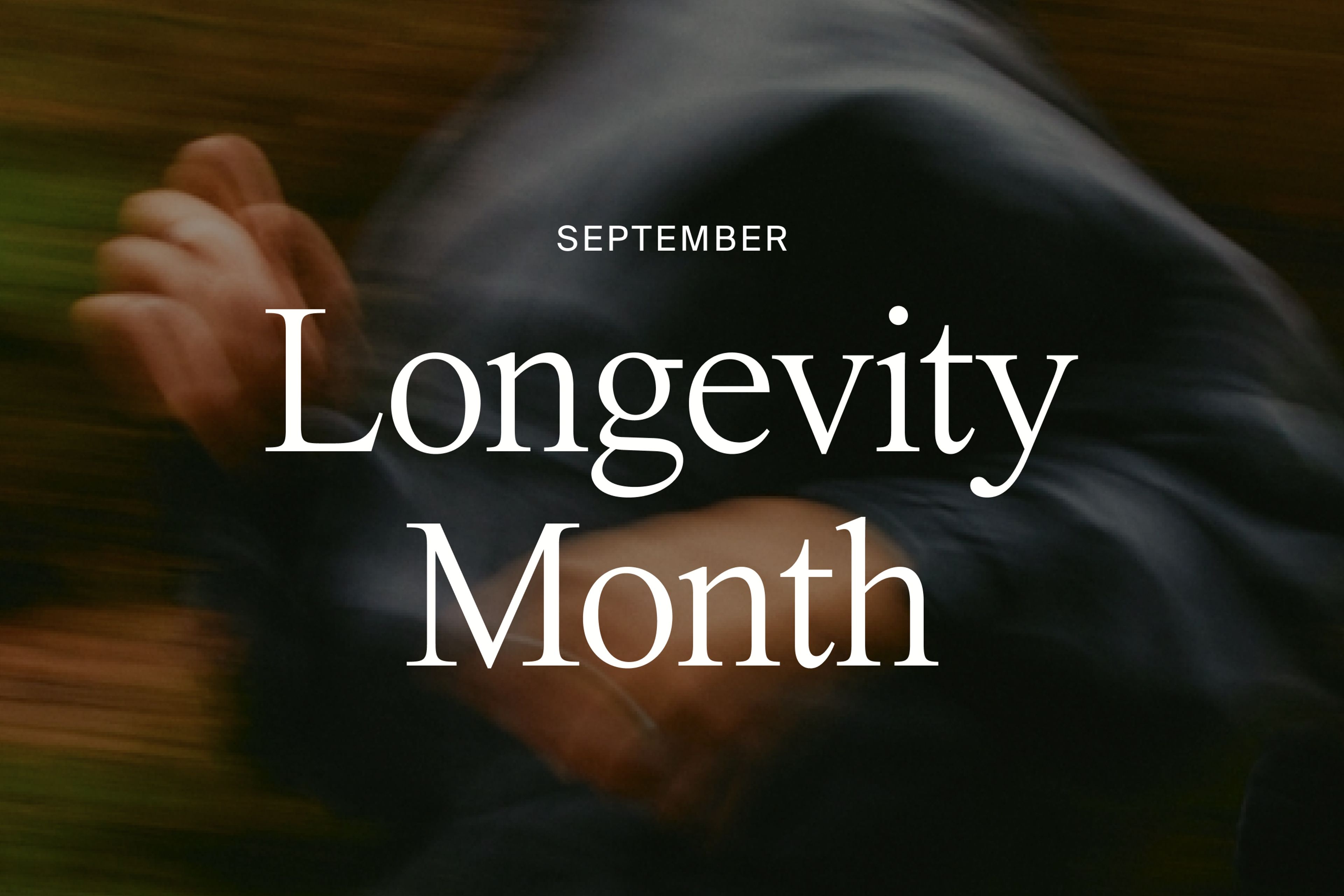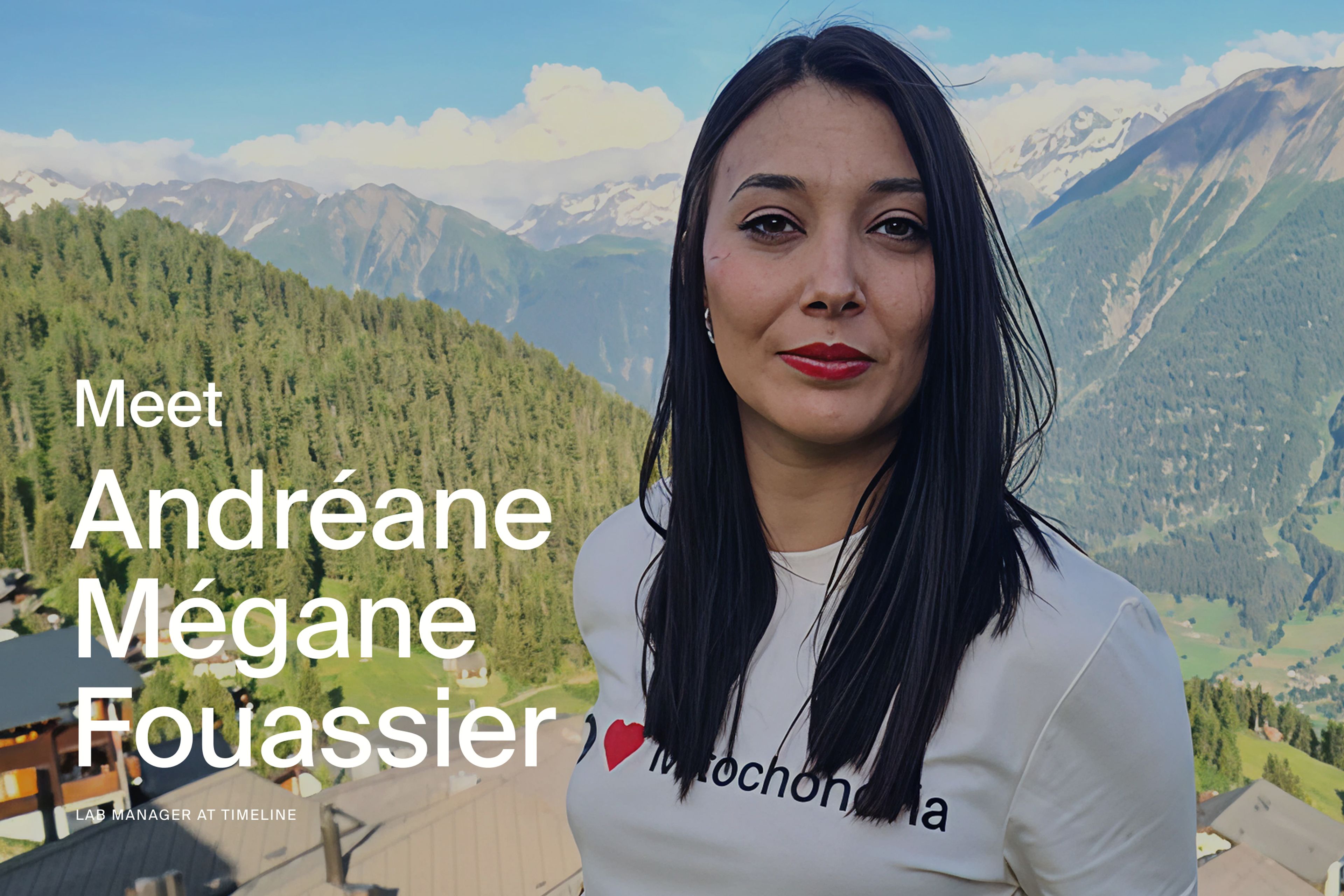Putting Longevity Under the Microscope
Chris Rinsch, PhD joins Morgan Zanotti to talk the “powerhouse of the cell,” aging, and how to get our mitochondria working at optimal levels.

Intro here
Topics covered
- A.
- B
- C
Transcript
- Chris Rinsch
- It's a postbiotic.
- Morgan Buehler
- Postbiotic, yeah, you said that. I don't even know what that is. You're way above my pay grade here, Chris.
- Morgan Buehler
- Hello, everyone. I'm Morgan, co-founder of Primal Kitchen and host of the Primal Kitchen Podcast. Today, I'm talking to renowned scientist, co-founder, and CEO of Timeline, Dr. Chris Rinsch. For more than two decades, Chris has been an innovator in the life sciences arena and developed Timeline in 2007.
- Morgan Buehler
- Timeline is a health science company that develops biotechnology to improve mitochondrial health, muscle strength, and endurance in humans. Today, Chris is going to be talking about the company's proprietary technology, Mitopure, and the future of health sciences.
- Morgan Buehler
- Before we get started, a brief reminder that any and all opinions and views shared by hosts and guests in this podcast are the speaker's own and do not represent the view of Primal Kitchen or its affiliates or parent company. Hello, Chris. How are you?
- Chris Rinsch
- Hi, Morgan. Doing great. How are you doing?
- Morgan Buehler
- I'm good. It's great to connect. I'm super excited to have you here educate us on all the things. Where in the world are you?
- Chris Rinsch
- I'm in Switzerland right now. Thanks for having me.
- Morgan Buehler
- Yeah, it's great. What time is it there?
- Morgan Buehler
- Is it the evening?
- Chris Rinsch
- It's around 6:40.
- Morgan Buehler
- I love it. Okay, well, thanks for joining us so late. You're probably ready for dinner, but we're pumped to learn more. You got to give us a little lowdown. What is mitochondria health, cellular health? Why should the listeners care?
- Chris Rinsch
- Sure. Well, let's start with mitochondria. What are mitochondria? They're basically the batteries inside of all of our cells. What they do is they create the energy that is responsible and that is needed for all the biochemical reactions inside of your cells and basically for your cells to function. All of your cells, with the exception of your red blood cells, contain mitochondria, and these mitochondria are constantly producing ATP or energy as we walk, as we breathe, as we sleep.
- Chris Rinsch
- That's essentially to keep the cells functioning well and not only the cells functioning well, your organs that are comprised of your cells, and then consequently, your entire body, and keeping that functioning optimally.
- Morgan Buehler
- I love it. Okay, and so how does that play out in the day-to-day life of someone? What would they notice if they had unhealthy mitochondria? What would they notice if they had healthy mitochondria?
- Chris Rinsch
- Well, as I was saying, mitochondria are really these batteries inside of ourselves, and so you feel the energy. Not only would your cells have a decline in energy if the mitochondria weren't functioning better, you would feel it. You would feel less energy.
- Chris Rinsch
- When you see better mitochondrial function, you see better performance in general. It's been attributed to better muscle performance, for example. We've spent a lot of time here at Timeline looking at muscle performance, specifically when we try to act to improve mitochondrial function.
- Morgan Buehler
- Cool. Can you measure this? Can you measure mitochondrial health?
- Chris Rinsch
- Sure. Well, in humans, you can measure it in a number of ways. You can take a look at the actual cells. You can take what they call a biopsy or a sample of your cells by taking a little piece of the cells or tissue from your muscle. For example, your leg muscle, you can take a little measurement of your mitochondrial function inside of the tissues of your leg by looking at gene expression profiles.
- Chris Rinsch
- That's something that we've done in clinical studies. We looked at the gene expression profiles in the tissue before and after treatments with our product, Mitopure
- Morgan Buehler
- Cool. What did you find?
- Chris Rinsch
- Well, we see that after a month of taking Mitopure, you're seeing an improvement in the mitochondrial function. We can talk a little bit about how you can modulate mitochondrial function or improve mitochondrial function. Essentially, what we've been concerned with is how do you keep your mitochondrial function from declining. If you have a declined mitochondrial function, and how do you increase it?
- Chris Rinsch
- Normally, in all of your cells, your mitochondria have this normal life cycle. As they're producing energy, they actually create these reactive oxygen species that can then attack the mitochondria and basically damage them. Our cells have this process inside of them that allow the cells to basically recycle the damaged mitochondria.
- Chris Rinsch
- When you recycle the damaged mitochondria, that clears away space to make new mitochondria. Basically, the recycled components are then reconstituted into the healthy mitochondria so you have a better cellular function, a better mitochondrial pool inside of your cells, and then consequently, your tissues function better.
- Morgan Buehler
- I love it. How is this related to aging? Is this something that declines with age and this can offset some of those declines or how does this all play out?
- Chris Rinsch
- Sure. I mean, Morgan, as we're getting older, what happens is that our mitochondrial function declines. It's really linked to our activity, our diet, general lifestyle. It's been shown that people who, as they get older, having more trouble getting around and walking, and you can call these people, prefrail or even frail, where they have difficulty getting out of the chair. They tend to have a lower mitochondrial function.
- Chris Rinsch
- In fact, we did a study, one of our first clinical studies that was non-interventional was one where we looked at people who were 65 and older, and we compared those people who were very active and running or cycling every day versus those people who were having trouble walking around and were considered pre-frail.
- Chris Rinsch
- We looked at the functionality of the mitochondria and the muscle tissue and the skeletal muscle tissue, and we saw a big drop in terms of the gene expression and overall functionality of the mitochondria in these pre-frail people versus those people who were active all the time.
- Morgan Buehler
- Interesting. Mitopure can replace some of that that maybe isn't being achieved by lifestyleers, just happening as a result of natural anti-aging?
- Chris Rinsch
- Yeah. Now talking about Mitopure, Mitopure—and I'll get into that—it's a food ingredient that is actually acting on this pathway of stimulating this recycling of your mitochondria. It boosts the natural recycling, this mitophagy, and consequently, you can restore the mitochondria function to an optimal level.
- Morgan Buehler
- Wow! You're seeing impressive results in just 30 days. Do you guys have longer-term studies or how long have you been studying the effects on mitochondria?
- Chris Rinsch
- Morgan, we've done a number of clinical studies, and the first one was 30 days. We were looking just at the expression and muscle tissue. But then we moved on to looking at physiological effects and we started treating people for as long as four months.
- Chris Rinsch
- We've run a couple of studies now treating people for four months long, and we saw after four months and individuals who are 40-65 years old and more sedentary lifestyle, we saw an improvement in their leg muscle strength by 10-12% after four months. We also saw the same type of benefit on the mitochondria function.
- Chris Rinsch
- There's a couple of things we do. In addition to looking at the biopsies, we also take blood samples and we look for metabolites that are changing with time. One of those is acylcarnitine, and the acylcarnitine levels were shown to decrease in those people taking Mitopure.
- Chris Rinsch
- That was something very interesting to see because the combination of seeing something locally at the muscle level, but in the plasma systemically, this gives you an indication that there's more of a systemic impact on the mitochondria. It's not just localized to muscle, but you should see it elsewhere. That's causing us to now explore in other studies outside of just the muscle tissue.
- Chris Rinsch
- But continuing, as to think about the impact on muscle tissue, we ran a second study in older individuals who were 65 and older and who were showing some issues with walking at the onset. They were screened by having a lower endurance. What we showed was that basically, after taking Mitopure for two months, we showed an improvement in the muscle endurance, in both the hand muscle and in the leg muscle.
- Morgan Buehler
- Crazy. So cool. There's benefits, though, if you're not… You've done a lot… It sounds like a lot of this research is done on older individuals, but what about if you are… I guess you said 40-60, but what if you're not pre-frail?
- Chris Rinsch
- Well, it's an interesting question. We're currently running some studies in a younger population in athletes, but I would say that we now have well over 15,000 people who are taking our product, and we get a lot of feedback from people. This spans the whole age gamut from the 20s all the way to the 80s. What we've seen in athletes, for example, we had a number of athletes who started taking our product, and they seem to feel the benefits there.
- Morgan Buehler
- Cool. I love it. How did you get into this? This is like such a big problem to tackle, I feel like, so I'm just so curious how you stumbled on this.
- Chris Rinsch
- When we started, the idea was to really explore functional foods. We were thinking about aging in general and this idea of keeping ourselves functioning at our optimal. We were thinking about also the diseases that are associated with aging. That was one of the fundamental starting points because the company was created by people who were scientists, myself, and thinking about pharmaceutical products coming from that background.
- Chris Rinsch
- Most of the diseases that are associated with aging are slow degenerative diseases, and you really realize that you have them when it's too late. The thought was, can we interact earlier and smarter with nutritional products and making a functional food so people could take that into their own hands and try and manage their health in a smarter way with nutrition that was clinically studied?
- Chris Rinsch
- Now we're not targeting diseases with nutrition, but trying to manage your health as you get older and keep yourself at your peak throughout your life. That was how that started, and we began looking at a number of different natural products.
- Chris Rinsch
- The idea was to really look at different compounds that are found in natural products and to see which natural products might be more appropriate to improve our health and which might have compounds or extracts that could offer some real health benefits.
- Chris Rinsch
- After looking at a few, we started focusing in on the pomegranate. This was very interesting. We started doing things like developing pomegranate extracts, and then we were bringing in pomegranates, we're juicing them, doing extractions, measuring what was inside of the extracts, and then testing those in various preclinical models to see did they have any effects.
- Chris Rinsch
- As that exploration continued, we started thinking about not only the compounds inside of the pomegranate and one of the most predominant compounds, a family of compounds called the ellagitannins, and they're complex structures. One of those in the pomegranate is called punicalagin.
- Chris Rinsch
- We started looking at punicalagin, and then we realized that inside of the intestine, basically the punicalagin is digested and then converted by the gut microflora, all the little bugs you have in your intestine into a compound called Urolithin A. This Urolithin A is really a postbiotic, and at the time it was thought the body's way of basically clearing out these ellagitannins that you are consuming from your diet and then just eliminating them from the body.
- Chris Rinsch
- But in fact, we took a look at those compounds and we said, Well, maybe there's some bioactivity there. What we did is we started studying them, looking at them in worms, actually, in the very beginning. We're doing this together with a professor here at the EPFL who's renowned in mitochondria biology, Professor Joan O'Murx.
- Chris Rinsch
- What we saw there in his lab was that by giving these small worms, Urolithin A, they were able to boost their longevity and their lifespan by 45%-50%. That was super remarkable. This is something that Professor O'Murx hadn't seen before. We started exploring that further and we were looking at the… Basically, you can also look at muscle function in worms by looking at how they move as they get older.
- Chris Rinsch
- We saw this improvement there, a whole body improvement at the organism level of the worms by this longevity, but also this whole concept that there was an improved movement of the worms. Then we decided to go to that next level and explore the impact in mice. This was an interesting study where we started out looking at mice and treating them for quite some time, several months. We were looking at mice that were metabolically challenged, and so they-
- Morgan Buehler
- Like fat mice? Were they fat mice?
- Chris Rinsch
- -Yeah, basically, we gave them the supersized diet to give them a little bit of a metabolic challenge. Then we gave some Urolithin A and others we didn't give Urolithin A. What we saw after a number of months, we went and we were looking at their activity and we put them into these, they're like the hamster wheels, equivalent for a mouse.
- Chris Rinsch
- What we saw was that they were running about 50% longer and 50% further when they were taking Urolithin A than when they weren't. We were also seeing an improvement in their muscle strength. This is a seminal moment for us where we realized that it was having a very important impact not only on the mitochondria, but also on the muscle function and the physiological function.
- Chris Rinsch
- Then we decided to start looking at older mice, so ones that are close to the end of their lives, approaching 18-20 months of age, and then treating them for shorter periods of time to see if the impact could happen quicker. Sure enough, we saw after a couple of months in older mice, we also saw an improvement in the muscle function.
- Chris Rinsch
- This was obviously really exciting, and so it caused us to start thinking about the whole translation into the clinical studies that I mentioned earlier and the development of Urolithin A into Mitopure, which is the branded ingredient that's in our product.
- Morgan Buehler
- I love it. It does come from pomegranates, the ingredients derived from pomegranates?
- Chris Rinsch
- Yeah. It's not extracted from pomegranates. In fact, you can't find any Urolithin A inside of a pomegranate. You have the ellagitannins that are inside of the pomegranate. What we do is we've synthesized Urolithin A at a very high purity and molecular identical manner to the Urolithin A that our body creates.
- Chris Rinsch
- When you eat foods and you get Urolithin A naturally from the foods that you eat, you need to have the right gut microbiota. The Urolithin A is created by the body. It's not-
- Morgan Buehler
- Okay. It's almost like a reaction after you eat something.
- Chris Rinsch
- Yeah, it's a postbiotic.
- Morgan Buehler
- A postbiotic? Yeah, you said that. I don't even know what that is. You're way above my pay grade here, Chris. Tell me more.
- Chris Rinsch
- [inaudible 00:19:23] postbiotics are really the product of the inputs into your body and that are acted on by the gut microflora inside of your intestine. Yeah. When you have postbiotic, in the case of your Urolithin A, before it becomes that postbiotic, you have your punicalagin that comes in and then is transformed by that gut microflora into Urolithin A.
- Morgan Buehler
- Got it. If I take Mitopure, do I need… I don't need anything. I don't need to do it. It's not dependent on my own gut health. It's going to be effective regardless you guys said.
- Chris Rinsch
- Well, it will be-
- Morgan Buehler
- Synthesized, okay.
- Chris Rinsch
- Exactly. You circumvent all of the issues of not having the right gut microflora.
- Morgan Buehler
- Got it.
- Chris Rinsch
- Which is really important because we want to make sure that if we were going to give pomegranate extract, for example, then you wouldn't be guaranteed to get any exposure to Urolithin A. But by giving Urolithin A specifically at precise doses, we can ensure that you get an adequate level of Urolithin A actually into your bloodstream, and then that can hit the targets that it needs to stimulate this mitophagy process inside of ourselves.
- Morgan Buehler
- Interesting. Okay, so talk to me about longevity. I'm sure it's hard to measure at this point because you haven't had people on it for decades that you can see if there's any like… But you guys are playing in this whole life extension place, if you will.
- Chris Rinsch
- Well, the way I think of longevity is more about healthspan rather than lifespan.
- Morgan Buehler
- Okay, I like it.
- Chris Rinsch
- Healthspan meaning that as you're getting older, what we all would love to do is live the best possible life at each moment in our lives. That's really the definition of healthspan. If you can keep your body functioning optimally as you get older, you're going to have a really great healthspan.
- Chris Rinsch
- What you don't want to do is live for a long time and not be very healthy. By improving the mitochondrial function inside of your cells, you actually improve the metabolic function of all of your cells and then your organ function and then consequently, your whole body function and your skeleton.
- Chris Rinsch
- Basically, I think one thing it's important to think about is that when we're trying to supplement our bodies, I think a lot of us take different dietary supplements to complement our diet. When you supplement your diet, many people think, well, what do I need to add together to have that ideal supplementation or what is the most important vitamin or mineral I should start with?
- Chris Rinsch
- The way I think about it is that what you really want is the mitochondria functioning optimally first, because it's producing the energy inside of your cells. Then you can start supplementing with other type of vitamins and minerals that are also important in the biochemical reactions inside of our cells.
- Morgan Buehler
- In a sense, like if your cells aren't even healthy, like if you don't have optimal mitochondria, you could be wasting money on other supplements because you can't even utilize them or not so much.
- Chris Rinsch
- Yeah. Essentially, energy is the most important thing for your cells and for cellular reactions. You really want to be able to have to maximally benefit from all of the different vitamins and mineral supplements that you may be giving. You want to have your cells from an energetic standpoint optimal.
- Morgan Buehler
- Awesome. Okay, so anecdotally, say a science aside, what are people saying when they've been on your product for a while?
- Chris Rinsch
- I can give a number of different things here. Well, I can talk about energy levels in general. I stopped taking coffee a couple of years ago after switching to Mitopure, and I haven't felt that need for coffee. I've heard this from several people that we've met that it boosts your general overall energy levels.
- Chris Rinsch
- But in terms of sports and performance, we've heard recovery stories from people who are basically recovering from after-exercise that somehow they feel like they're recovering much faster following some exercise. But we haven't tested that clinically yet. We're in the process of doing that.
- Chris Rinsch
- Well, there's a lot of stories of athletes saying that they were once in the middle of the peloton, and now they're at the front of the peloton when they're riding with their friends. There's been a number. I know people who have said that they've had issues with pains that are cramps in their leg muscles before, and they started taking our product and those pains or cramps have gone away. But these are anecdotal and-
- Morgan Buehler
- Yeah. You don't even need anecdotal because you guys have done so much research. Compared to other supplement companies, the amount of research you guys have done on this ingredient is tremendous.
- Chris Rinsch
- Yeah. We've run a number of clinical studies. We have four clinical studies completed. Three of those have been published in very high peer-reviewed journals, all talking about mitochondrial function and muscle function in adults and healthy adults. We have a number of other studies going on.
- Chris Rinsch
- In fact, one of the things that was interesting is that we're starting to look beyond just muscle function. Muscle function was an entry point for us. Now we're looking also at mitochondrial function in the immune cells. This is something very interesting because there's this whole idea of immune aging, and immune aging happens when that mitochondrial function declines and so there was a problem-
- Morgan Buehler
- What is immune aging? What does that mean?
- Chris Rinsch
- Well, it basically means that the immune cells aren't stem-like, and they can't react to infections or challenges like cancer as well as they could when they were younger and they weren't aged.
- Morgan Buehler
- Got it. It's like what we were seeing during COVID when it was like, if you're older, you're screwed.
- Chris Rinsch
- Well, and it's a good point that older people often can't react to vaccines, for example, because they can't mount a very strong-
- Morgan Buehler
- An immune response. Okay, It's just…
- Chris Rinsch
- What we'll be looking at in the two studies is, one of the studies that's kicking off is really looking at a characterization of the effects of Mitopure on immune cells and on the mitochondrial function of immune cells. In the second study that we're conducting here in Switzerland, we'll be looking at people post-cancer treatment, and we'll be looking at the evolution of their immune cells post-cancer as we try to improve the quality of their immune cells.
- Morgan Buehler
- Wow! Interesting. Very cool. Okay, you guys launched a skincare line, so tell me about that.
- Chris Rinsch
- Indeed. Mitopure and mitochondria aren't only good for taking orally, but for our skin, you also have a lot of mitochondria throughout your skin cells. The interesting thing that we've observed is that at least when we're looking in vitro, we see the same type of impact on skin cells that we see on muscle cells in vitro, and that is this improving of the mitochondrial function.
- Chris Rinsch
- We've developed creams that you can apply that will… We've run a couple of free clinical this last year looking at the effect of on the skin on the face, in fact, and on the the and various parts. What we see is that we see an in terms of wrinkles after just a few weeks. That's something that's quite-
- Morgan Buehler
- After just a few weeks?
- Chris Rinsch
- Yeah.
- Morgan Buehler
- That's crazy.
- Chris Rinsch
- What's fascinating is that really looking at these two pathways. It's the intrinsic and the extrinsic aspects of skin aging. The extrinsic skin aging is when you have aging that's caused by UV light and pollution, whereas the intrinsic skin aging is caused by just the natural aging of the skin and the decline in mitochondrial function and decline in collagen levels.
- Chris Rinsch
- Both are very important. In fact, the extrinsic aging might be even more important than the intrinsic aging because we were so often out under the sun and getting exposed to UV light and pollution. But what we're seeing-
- Morgan Buehler
- When you say more important, you mean more important for wrinkle treatment?
- Chris Rinsch
- Well, it may be-
- Morgan Buehler
- More effective?
- Chris Rinsch
- Well, having the extrinsic effects on aging are more dramatic. For example, if you're out in the sun more often-
- Morgan Buehler
- Got it. Okay.
- Chris Rinsch
- -that's going to impact you more than just the natural aging. But the combination together cause a problem there. It's synergistic in a bad way. But what we've seen, through our clinical studies, we've seen that we can improve the wrinkles on this in general, so from more of a cosmetic or appearance perspective, but we've also done and we've been able to show that we're able to improve things like…
- Chris Rinsch
- We see a change in collagen there and the different gene expression linked to collagen degradation, so a decline in this. Also from this extrinsic aging that we were talking about, what we is that following UV exposure when we treat with our creams, that we are able to reduce the inflammation of the skin. We see this effect against UV insults as well.
- Morgan Buehler
- Wow! That's crazy. Do you think it just works while you're using it, or do you think it's actually causing changes to the skin?
- Chris Rinsch
- I think it's working. You need to apply it every day, of course, like every skin cream. It takes a certain number of weeks before you start to see the actual visual effects and those improve with time.
- Morgan Buehler
- Cool. Side note, I did receive some of the skin cream for those listening, and it's really nice. It has a really nice sun. It goes on well. It's good. You guys formulated without any [inaudible 00:32:03] or those nasty things?
- Chris Rinsch
- Yeah, it's a very green and clean formulation.
- Morgan Buehler
- Yeah, cool. Is there anybody doing anything else on mitochondrial health that even comes close to what you guys are working on? What are you seeing in the marketplace?
- Chris Rinsch
- I think that there's no one else acting on mitochondria that stimulates this pathway of mitophagy. But in terms of the clinical studies that have been done, I think we're really setting a new standard in terms of developing products and testing them at the level that even pharmaceutical companies might test their products.
- Chris Rinsch
- We're really trying to set the bar high. In terms of other products out there touching on mitochondria function, there are a few out there, but not hitting this pathway, which is so key to maintaining mitochondrial function. In the mitochondria, in general, the in optimal state.
- Morgan Buehler
- Very cool. I love it. How long have you been at this? You've been working on this for quite some time, haven't you?
- Chris Rinsch
- Yeah, we've been doing this research for over 10 years now, Morgan. Biology takes time and clinical trials take time. You want to make sure that the data is right. Before you go into humans, you want to test that in a number of preclinical models where you can confirm that the data and the science is perfect. As I said, this has been published in a lot of really high impactful scientific journals out there, and they require a lot of experimentation to get into them.
- Morgan Buehler
- Yeah, awesome. So cool. Aside from Mitopure because I'm pretty excited about it, as you know personally. But aside from Mitopure, what are you most excited about? What are you seeing in the space? What else are you excited about in health and wellness these days? Anything fun we should have on our radars?
- Chris Rinsch
- Well, I think that the whole longevity space is a very interesting one. There's been not only the different foods that you take and the supplements that you take. There starts to be more devices that people are looking at and even dietary regimens. This intermittent fasting is becoming very popular, and that could be… An intermittent fasting and fasting, in general, is something that leads to this whole process of mitophagy as well.
- Chris Rinsch
- That and sports and being athletic, that can naturally stimulate the process of mitophagy. This idea of combining the supplements that you take with the different lifestyle changes like the intermittent fasting and other types of sports that you might be doing. There is this combination that I think is going to be trending as we continue in this whole longevity space. I think this will be something that we should keep an eye on.
- Morgan Buehler
- I love it. What does your diet look like these days? I gather you're pretty committed to this whole health and wellness thing personally.
- Chris Rinsch
- Yes, I'm very committed.
- Morgan Buehler
- You grew up in California, right? You're a West Coast nuts and berries guy by birth. Yes?
- Chris Rinsch
- Of course.
- Morgan Buehler
- Yeah. You're in Switzerland. I feel like Switzerland just has a good, healthy aura about it. I could be wrong.
- Chris Rinsch
- Yes, it does. Mediterranean diet is pretty standard over here, so we get used to that.
- Morgan Buehler
- Yeah, I love it. Okay, what's the worst thing you've ever done for your own health, Chris?
- Chris Rinsch
- I think perhaps those desserts that we take from time to time, that might qualify.
- Morgan Buehler
- That'll get you. I like it. Okay. This is good. You're pretty pure. I get some pretty crazy responses on that one. Okay, let's see. What is biggest failure or biggest success entrepreneurially in the last, I don't know, I guess, in your career in general?
- Chris Rinsch
- I think the biggest success has to be what we're doing now with Mitopure. I think that perhaps if we talk about failure, maybe if we could have done it a lot quicker and discovered this a lot sooner. But I think this has been a pretty great success story, and thanks to a great group of people here at Timeline. I mean, this couldn't have been done without a fantastic team of scientists and our excellent chief medical officer, and all the marketing people involved.
- Morgan Buehler
- Very cool. Okay, this is my last question I ask everyone, so you can tell me. But what's something most people don't know about you? This is the drum roll question that you were nervous for, not really, before we started. Could be anything, something most people don't know about you.
- Chris Rinsch
- Living here in Switzerland for a while, a lot of people don't realize that I'm originally from California. That's probably I would for people here in Switzerland and those when I'm over in the US, they probably don't realize that I'm-
- Morgan Buehler
- When we met, I thought you were Swiss. When we chatted prior, I did not know you were from California either, so that's a good one. I was telling you like, "You know us Americans." Then I'm like, "Wait, you were…"
- Chris Rinsch
- You were [inaudible 00:38:23] European last name, too, Morgan.
- Morgan Buehler
- Very German. Well, now it's Italians and not even… My maiden name was Buehler, which is very German, but yeah, I love it.
- Chris Rinsch
- It's Swiss German.
- Morgan Buehler
- Is it? Buehler, Swiss German?
- Chris Rinsch
- Yeah.
- Morgan Buehler
- Yeah. My name, Guten Morgan, is good morning in German too. Yes. But American through and through. Well, awesome. It was so great to meet you. I love what you guys are doing at Timeline. Can you give the audience just a little nudge on where they can find you guys if they want to try our products?
- Chris Rinsch
- Sure. You can find us at timeline.com. Yeah, it's easy to find us and I guess we'll probably put a link somewhere.
- Morgan Buehler
- We will. We will put a link somewhere and we'll send you out in the inter-webs to the Primal Kitchen folks. Thank you so much, Chris. It was great chatting.
- Chris Rinsch
- Thanks so much, Morgan, for having me today. This is great.
